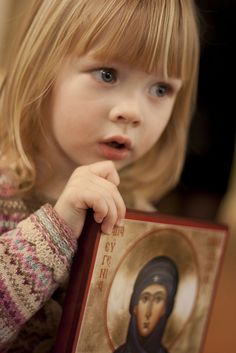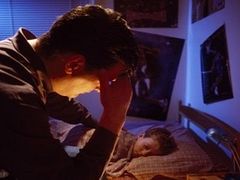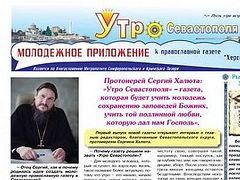Source: Raising Saints
March 7, 2016
Praying For Our Children Part I featured the wisdom of St. Porphyrios, and we closed with his beautiful prayer:
Lord Jesus Christ, give Your light to my children. I entrust them to You. You gave them to me, but I am weak and unable to guide them, so, please, illuminate them.
I love that prayer. I think it is so important for us to acknowledge our weakness, our inability to guarantee a good life or even to force our children’s faith. Too often we live under the delusion that we are in control of our families, and we’re not. Look how we worry over them and beat ourselves up, berating ourselves for doing a less than perfect job! We act as if we should expect perfection from ourselves (which is certainly not humble) and we seem to be claiming that our actions that will determine the future. How arrogant of us! We should not be surprised or outraged to see our own weakness, and we should know that God is in charge. If we can acknowledge that we aren’t really able to save these children, then we open ourselves to asking God to do it, asking Him to take over and to inhabit these young people and to let the Holy Spirit lead them to joy and eternal life.
As long as we think that we’re in charge, we don’t really offer our kids up to God. As usual, pride will block us up and only humility will open the doors. St. Porphyrios’ prayer is humble: “I entrust them to you. You gave them to me, but I am weak and unable to guide them, so please, illuminate them.” In humility, we weak ones hand our children over to God.
You know, over the years, my least favorite Bible story has become my most favorite.
For years, every time I encountered that image of God telling Abraham to sacrifice his beloved son, Isaac, I shuddered. I struggled to recognize the God who would demand such sacrifice. He told Abraham to take his son up on the mountain, to bind him, to kill him and burn him, as a sacrifice to God. What kind of heavenly Father commands this, and what kind of earthly father obeys? From start to finish, I hated this story. My horror was only a little bit ameliorated by God’s last minute relenting; after Isaac knows that he is the sacrifice, after Abraham has done everything but actually shed his blood, God stops him. We’re supposed to understand from this that God is against human sacrifice. Apparently, He played this cruel game, traumatized this righteous family that He loves, to make a point. Somehow, Abraham almost killing his son means that we should not sacrifice our children. I just didn’t get it. I couldn’t see the God I know in this strange story.
Eventually, though, my own life circumstances put me in a position to appreciate it.
You likely know from the Raising Saints intro that we have five daughters, but what you probably don’t know, is that we have more children. We have a son, who should be eight years old, but who passed away as an infant. We also have a child who was never born, who miscarried before birth. So when I say that I have ‘five daughters’ I am not mentioning my other children, whom I love every bit as much.
Parents who have lost children will tell you that we become members of a club that we never wanted to join and that we gain some wisdom we really never wanted to have. It’s true.
Of course, we learn from each of our kids. If your kid is a soccer fanatic, you’ll learn all about soccer. If your kids love dinosaurs or science fiction, you’ll learn all about that. And if your child has a medical issue, you become an expert on that condition. So when my son, Luka, passed away, I had to learn all about heaven and how it worked. I was forced to grapple with the idea that Luka was in God’s hands. Really in God’s hands. Not in my hands at all. I could pray for him and ask for his prayers, but there was nothing to buy him or to teach him, nothing to provide, not even food. My role as Luka’s mother was henceforth limited to praying for him and to preparing the occasional koliva in his memory. I wrestled with it, and slowly came to see what wise people like St. Porphyrios were saying all along: every one of us is in God’s hands; all of us and all of our children belong to God. We may tell ourselves otherwise, but alive or dead, we are all in God’s hands. We are stewards of our children, but they have always been and will always be His children. And I am so grateful that God loves my son, and that He takes care of him, and has granted him eternal life.
I used to joke with my friends that I had learned so much about grief, and yet I’d fervently hoped that all that knowledge would go to waste I didn’t want to ever be in a position to benefit from that hardwon wisdom again.
But then, five years later, our four month old daughter went into liver failure, and I had the opportunity to consider that knowledge all over again, as I sat beside her in the hospital for months.
I thought a lot about Abraham. He and Sarah had so wanted children but they never had any, until they were very old 90 and 100, and the three angels of the Lord visited them and told them that they would have a son. They laughed, but it was true: they were given Isaac, whom God promised would become the father of countless descendants, of God’s chosen people.
So on that day, when Abraham walked up the hill to sacrifice his child, it was THIS child, the child who had been promised to him by the angelic visitors who in the hospitality icon represent the Holy Trinity, this holy trio had promised that Isaac would be the ancestor of a great people. Isaac was the greatest gift Abraham had ever been given, and now God wanted him back.
Presumably, if Isaac died, he couldn’t become an ancestor of anyone, and yet Abraham didn’t argue with God. Perhaps he trusted that all things are possible with God; perhaps he knew that God could resurrect Isaac if He desired, or perhaps he thought that Isaac’s death might be necessary to the formation of that new people. Somehow, Abraham didn’t demand to understand God’s logic, but accepted that God is a mystery who loves us. Abraham didn’t ask questions, he just obeyed the Lord. He loved God and he trusted God, and he knew the truth: that Isaac belonged to God. Isaac was God’s child and God would take care of him.
When my daughter was in liver failure, I watched her health deteriorate, I saw her turn yellow and then I saw her stop eating and sometimes labor to breathe, and I could not do anything for her. Any illusion I had that I was in charge of her life was shattered: I had no power to save her. Even the wonderful doctors to whom I was entrusting her could not give me any guarantees. They didn’t know. They would do their best, and yet, they just didn’t know how it would turn out.
Suddenly, I understood Abraham. I could see him in my mind’s eye, lifting up his son and offering him on that altar. I offered my daughter up in the same way. I didn’t ask to understand why God had allowed us to be in this situation, but I prayed for her and offered her to God, to the only One with the power to help. I knew that God could pour down His grace and carry all of us through this, regardless of how it turned out medically.
Abraham’s offering was not selfish, not the kind of parent’s prayer that demands its own way, demanding that God give us healthy, happy, faithful children because we want them. Abraham’s action acknowledges his own weakness and unworthiness, not even asking to understand God’s ways, but simply entrusting the child to its heavenly Father.
Christ taught us to pray, Thy will be done, on earth as it is heaven, and when someone is sick, we all know that “Thy will be done” can mean a person’s death as easily as his life, but we still pray it, because we know that God has our best interest at heart, that He will make things happen as they are meant to happen. So we began to pray something special for our daughter: Lord, give her what she needs. Lord, protect her and love her, and let this unfold as You will.
We are weak and imperfect, but God is the perfect parent. Our love is limited, but His love is without end.
Ultimately, I found the best prayer possible for my child. I simply called out, “Lord, your child needs you! Come, Lord, take care of Your child.” I recognized that this baby was His baby, and that He loved her even more than I did, and so my prayers became a simple call to point out to him that His baby needed Him.
We can pray for our children by humbly taking ourselves out of the picture and trusting children to God, simply calling to Him as to their true Father. “Come, Lord, Your child needs You.” and of course, sometimes, it’s really urgent and I’m sort of spiritually hollering, “Come right now, Lord! Quick! Your sweet child needs You!”
When we were in the hospital praying, I was writing meditations, and these writings are both a narrative of our journey and an exploration of what God’s love can do for us when we’re suffering.
A very dear priest, Fr. Drago Popovich, who would drive many hours to visit us in that hospital, told me that he would like to have my meditations in a book to give to suffering people. It’s hard sometimes, he’d tell me, to know what to say to parents who are being wiped out with worry and exhaustion, and sometimes telling them that God is at hand and ready to help can ring hollow. It’s the truth, but people can’t always hear it. Sometimes people look around a hospital or they think about a tragedy and wonder how God allows such suffering. Where was your God, they ask! They might even look at a well-meaning priest and say that he cannot talk to them about pain until he’s been there, that no one understands what they’re going through.
So once our little one had recovered and life had settled down a bit, I put together a book that might keep suffering people company, might point someone toward the sliver of light that God shined down on me, so that they could see it too. I’m hoping that this book will be company for anyone who is suffering, whether they’re watching a loved one struggle or experiencing their own personal pain. So when you hear an announcement at the end of this podcast for my new book, In God’s Hands, know that it’s a message of hope from someone on the inside. It’s my own testimony about how God holds all of us in His hands, and I truly hope that it will be helpful to someone out there.
That journey is really about learning to pray like Abraham, truly offering our children up to their heavenly Father without reservation. It’s about calling out, “Come, Lord! Your child needs You!” which is now my very favorite prayer for children. You know, it may be a good prayer for adults too! In the end, whomever we pray for, we can trust that God loves every single one of us as His very own child, and we can simply call to Him to remember them, trusting that He’ll know what they need.
May the Lord remember all of you and grant you what He knows you need!





